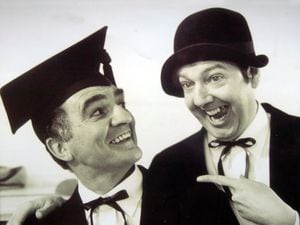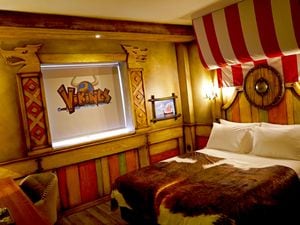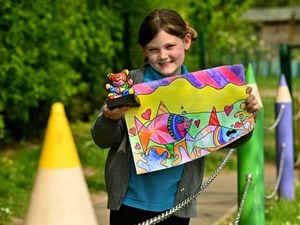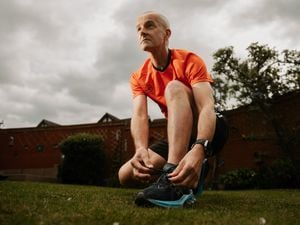Half a century in showbusiness, and there's more to come from Jimmy Cricket
It was a Wednesday night at a club in Middlesbrough, and a young Jimmy Cricket was waiting apprehensively for his turn on stage.

"There was this singer on before me, he did a few jokes, and they didn't go down too well," he recalls.
His act was blighted by sound problems, with the concert secretary motioning him to adjust his microphone. A member of the audience interjected, shouting at the organiser to give him a break. And his performance was abruptly brought to a close when the curtain was brought down while he was in mid flow.
The glamour of showbusiness....
"It was the closest thing you could get to being pulled off the stage with a big hook," he says wistfully.
We don't know what happened to the people who dismissed the young comic so brutally. But as he prepares for his tour to mark half a century as a professional comic, and looks back on a career which saw millions tune in to watch him on television every Saturday night, it is fair to say he probably had the last laugh.
And while that night in Middlesbrough was hardly a triumph, it gave him a good grounding in what was a tough career.
"There was a rule in those days that if you walked off, you didn't get paid, so you had to carry on, no matter how tough it got," he says.
"They had closed the curtain on me, so I got my money. It was only £25, but it was an important principle."
To mark his 50-year milestone, Jimmy comes to the West Midlands in September with a show at the Festival Drayton Centre in Market Drayton. He has also released his autobiography, Memoirs of an Irish Comedian, which tell of his rise from scraping by on northern England's unforgiving club circuit to having a prime-time show on Central TV.
He recalls an early appearance at a club in Manchester, where he performed under his real name Jimmy Mulgrew.
"I have to say, I didn’t go down too well,” he says. “My agent told me not to worry and work on the act." His agent then booked him in at the same club a year later, only using the name Pat O’Hare. This did not fool the hard-nosed club secretary, who was similarly unimpressed with his new persona.
"I must be the only comedian to have died in the same club under two different names," he muses.
But while it was a hard slog in the early days – "There were times when I would turn up at a club and think 'I really don't want to do this tonight'" – he never doubted that he would make it.
And one memory he will always treasure was performing alongside his childhood hero, the Dudley-born comedian Billy Dainty.
"In the early 1950s, my dad would take me to the opera house in Belfast, and then when he died, my older brother John carried on taking me to see the variety shows," he says.
"At the time there was this pop star called Terry Dene, who had been the golden boy of British pop music until he dropped out of the Army on medical grounds. So Billy came on stage and did this improvisation about how pop stars would be on the parade ground.
"I then watched him on television at the London Palladium, and I loved the eccentric dance he used to do,
"Billy’s act made such an impression on me that I used to practise it at home, and when I’d go out and perform it for my friends, my feeble attempts always got them giggling. He was a big influence on me, I made sure I had an eccentric dance in my own act, which was largely based on Billy."
Then in 1984, when his career was firmly in the ascendancy, Jimmy was invited to perform in pantomime at the Apollo Theatre Oxford – alongside Cilla Black and his hero Billy Dainty.
"It was amazing to be able to perform with him," he says. The following year he appeared with Dainty again in Aladdin at Nottingham's Theatre Royal, but sadly this would be the Black Country comic's last performance. By this time, Billy was suffering from prostate cancer and was unable to complete the season. He died in November 1986, aged 59.
If Jimmy's days on the club circuit were hard going, breaking in to television was not exactly plain sailing either. His breakthrough came when he was selected to appear on the ITV talent show Search For a Star, which was launched in 1979. However the infamous ITV strike, which took the station off air for 11 weeks, meant the original series was cut short, and he had to wait until 1982 before making his appearance.
His hit show And There's More, which ran from 1985-88 happened almost by accident, after his career had almost been stalled again by the fragile industrial relations which were still afflicting the television industry.
"There was an uneasy alliance between staff and management, where the slightest misunderstanding could result in the downing of tools and a mass walk-out," he recalls. On this occasion, everything appeared to run smoothly. The act had gone down well with the studio audience, and the crew were in good humour. And having kept his best sketch until last, to finish the show on a high, he strode onto the stage ready to wrap the performance up – only to be cut off in his prime.
"Before the floor manager could shout, ‘Quiet please-action’, an even louder voice shouted, 'That’s its lads, it’s 9 o’clock, down tools!',” he says.
"Within seconds the cameramen had deserted their cameras, the sound guys had taken off their earphones and the audience were slowly filing out."
"I kept wanting to shout 'Hey come back everybody. This is my career, this is what I’ve worked for all these years', but of course it would have sounded hollow in that empty studio. And when the commissioner came over to say they were going to turn off the lights, I realised that all my protests would have been fruitless. So I took a deep breath, dusted myself off, put on my best, 'That’s showbusiness' smile and headed back to the dressing room."
He didn't get the Thames series. But when a proposed show for Central Television starring Su Pollard fell through at the last minute, he speculatively sent his pilot episode in, and landed a prime-time six-part series called And There's More on Saturday night. It was perhaps inevitable that one of his first guests would be his mentor Billy Dainty, in what would be one of his last TV appearances. But the series, which ran for four series from 1985-88 also provided a launchpad for young, up-and-coming funnymen Rory Bremner and Brian Conley.
Television is a fickle beast, and it was inevitable that the level of exposure he enjoyed in the 1980s would eventually come to an end. Jimmy is philosophical about this, saying that at least it allowed him more time to spend with his family.
"At the time my children were all quite young, and I was working all the time while they were growing up," he reflects. "That's not to say that they didn't have to drag me out kicking and screaming though.
"You always want to be the next Morecambe and Wise, you always want that Christmas show, but you have to keep coming up with new material. Eric used to say, 'its feeding the beast'."
He is a little disappointed that the nation no longer collectively comes together to watch wholesome, family-friendly comedy on a Saturday night.
"There isn't much clean comedy around these days," he says. "I like some of the young comedians, I like Michael McIntyre, I love Tim Vine. I would like to see more family-type comedy on television."
Jimmy says he is just grateful to still be performing after half a century – and attracting a new generation of fans.
"I did a show at the Lowry Theatre in Manchester," he says. "There were all these young people in their 20s who said 'we have never heard of you, where can we buy your DVDs?
"That meant a lot."
*Jimmy Cricket: 50 Golden Years comes to the Festival Drayton Centre in Market Drayton on September 16, starting 7.30pm.





